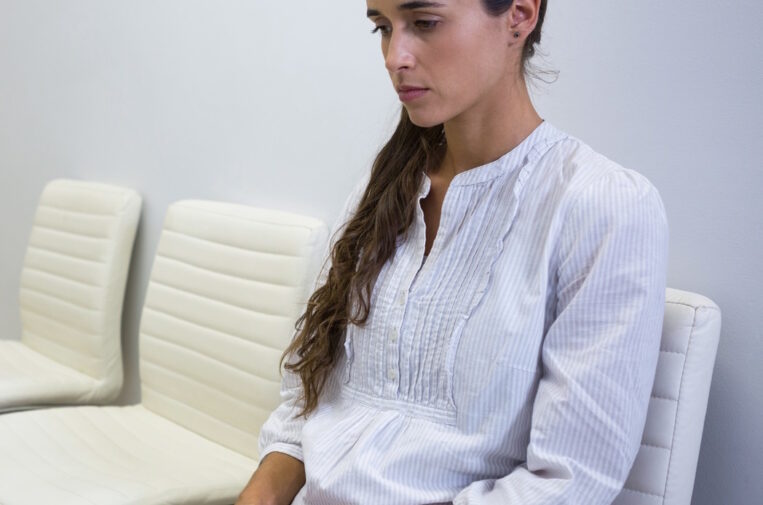My friend’s very real reasons why she – and others – are hesitant about seeking help from a fertility specialist.
I recently had a very candid discussion with a close friend about her two-year struggle with fertility. Before this conversation, I had no idea how long she’d been trying or what she’d been going through. She’s a tough, smart, independent woman who is great at tackling problems in her professional and personal life, and I was surprised to hear that she hadn’t seen a fertility specialist, or even spoken to her OB/GYN about her concerns.
For me, as a fertility specialist, I’m used to seeing women and couples who can’t wait to talk to someone like me and are open to using medical treatment to build their families. It was incredibly eye-opening for me to hear the very real reasons why someone would be hesitant to seek help from a fertility doctor.
After our talk, I kept thinking about everything that she had said and wondered how many people with similar feelings might be too afraid to take the first step toward learning more about their fertility and their options.
My hope is that this can provide some information to others who may feel the same way.
Seven reservations that hold patients back from seeing a fertility doctor
“I don’t want to do IVF.”
Who does? I know we are nobody’s Plan A. But seriously, there are many other treatment options besides in vitro fertilization (IVF). Fertility doctors can help you maximize your efforts at home with tips and techniques for “unassisted conception.” There are medications that can help optimize your cycle, as well as other lower-tech fertility treatments like intrauterine insemination (IUI).
Coming to a fertility clinic does not equal signing up for IVF. It may be one option presented to you, but it’s unlikely to be your only option. And it is just that, an option. Starting a conversation with a fertility specialist in no way commits you to doing something you’re not comfortable with.
I also find that many people have heard things that do not really represent the experience most women have with IVF. There is a lot of misinformation and many misassumptions about IVF that make it seem a lot scarier than it has to be. So, it’s worth talking to an expert to get the real story. It’s likely not half as bad as you are expecting.
“I don’t want twins.”
Me neither! I want you to have the safest, healthiest pregnancy possible. And that often means a single baby at a time. It’s true, that many of our treatments increase the chances of a multiple pregnancy (twins or more), but fertility doctors are getting better all the time at reducing and controlling this risk.
With IVF, we actually have a lot of control over this. With a single embryo transfer, the risk of twins is less than 2 percent. Talk openly with your doctor to really understand what the chances of multiples are with each treatment option you have, and know that our goal is the same as yours: a healthy, happy, and low-risk pregnancy.
“They’re just going to tell me I’m too fat, too thin, and need to stop drinking coffee, and alcohol, eating gluten, dairy, etc.”
It’s true that your fertility doctor will likely review lifestyle factors that may be impacting your ability to conceive, but know that many people who are not at an ideal weight or who consume alcohol/caffeine in reasonable amounts don’t have any trouble conceiving. So those factors are unlikely to be the only thing affecting your fertility. You still deserve to know if there is something else going on that we can help with.
Healthy looks different for a lot of people, and there is no one perfect weight, diet, or lifestyle for fertility. Many studies indicate that light alcohol intake is okay until you know you’re pregnant. Caffeine has also been studied extensively and there is no evidence that the equivalent of 1-2 cups of coffee per day is a problem. While many studies have been done looking at nutrition and fertility, there is no one best fertility diet and most people are fine continuing to eat reasonably without dramatic restrictions.
I personally do not ask my patients to make lifestyle changes that I don’t see good evidence for. I don’t want to deprive you of anything that we have reason to believe won’t really make a difference. But I promise, I will tell you, as any doctor should if I think there is something in your lifestyle that can make a difference in your success.
“If it was meant to be, it would have happened already.”
This is a tough one for me to accept, hence my career choice. There are many things that are possible with modern medicine that would be impossible without it. We fight infections with antibiotics and prevent others with vaccines; we operate on broken bones and sick organs. None of this would just happen on its own. So why do we view fertility challenges differently? Often there is a real, tangible medical issue with a concrete solution. If that solution exists for your problem, you deserve to know about it and choose if you want it.
“I’m afraid of what they’ll find. What if it doesn’t work?”
I get this. I really do. It’s scary to ask a question knowing that the answer could be hard to hear. And it’s super scary to try what you think is the last option and face the possibility that it might not work. But please know that we are able to help a huge number of the people who walk into our offices conceive. There are new advances in this field all the time, and we are able to help solve many fertility challenges – some of them, with really simple solutions.
Even if we do find something that we can’t fix, that information can be very valuable in letting go of the unknown, and the guilt that many people feel when getting pregnant isn’t easy. Knowing that the problem is beyond your control and it’s nothing that you’ve done or not done properly can be very freeing.
“I’m too old or it’s too late.”
Maybe, but likely not. There is at least one option out there for almost everyone. If not, your fertility doctor can explain why and point you toward other options for building your family. Ask. Don’t you want to know?
“I don’t know where to start. How do I find a good doctor?”
Start with the people whom you trust, such as friends or family who’ve gone through fertility treatment themselves. Talk to your gynecologist or family physician. How about your acupuncturist, nutritionist, personal trainer, counselor, etc.? These people know you and probably know the fertility providers in your area and can let you know who might be a good fit for you.
If you don’t feel comfortable with the first physician you see, seek a second opinion or a third. Most cities have multiple good options for fertility care and it’s important that you find the clinic or physician that feels like the right fit for you and your goals.
The bottom line is, you deserve to know what may be causing your fertility challenges and if there is a solution that might work for you. Please don’t be afraid to ask for help.




